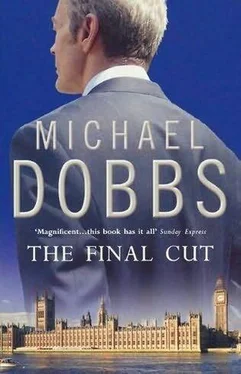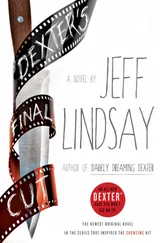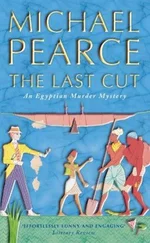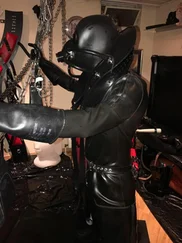Michael Dobbs - The Final Cut
Здесь есть возможность читать онлайн «Michael Dobbs - The Final Cut» — ознакомительный отрывок электронной книги совершенно бесплатно, а после прочтения отрывка купить полную версию. В некоторых случаях можно слушать аудио, скачать через торрент в формате fb2 и присутствует краткое содержание. Жанр: Политический детектив, на английском языке. Описание произведения, (предисловие) а так же отзывы посетителей доступны на портале библиотеки ЛибКат.
- Название:The Final Cut
- Автор:
- Жанр:
- Год:неизвестен
- ISBN:нет данных
- Рейтинг книги:5 / 5. Голосов: 1
-
Избранное:Добавить в избранное
- Отзывы:
-
Ваша оценка:
- 100
- 1
- 2
- 3
- 4
- 5
The Final Cut: краткое содержание, описание и аннотация
Предлагаем к чтению аннотацию, описание, краткое содержание или предисловие (зависит от того, что написал сам автор книги «The Final Cut»). Если вы не нашли необходимую информацию о книге — напишите в комментариях, мы постараемся отыскать её.
The Final Cut — читать онлайн ознакомительный отрывок
Ниже представлен текст книги, разбитый по страницам. Система сохранения места последней прочитанной страницы, позволяет с удобством читать онлайн бесплатно книгу «The Final Cut», без необходимости каждый раз заново искать на чём Вы остановились. Поставьте закладку, и сможете в любой момент перейти на страницу, на которой закончили чтение.
Интервал:
Закладка:
And the crown-encrusted envelopes of officialdom sat on the table before him. They were pursuing him, the agents of British imperialism, as they had done all those years ago, into his every hiding place, leaving him no sanctuary.
Inside he writhed like a worm cleft by a spade, a dew of despair settled upon his eyes, his mind blanked by bitterness. With a great cry of despair he lashed out, throwing the bottle from which he was drinking at the Satan's eye of a television screen. The bottle bounced off, hit the new window. Something cracked. But Vangelis didn't care any more. Urquhart had watched those same newscasts as Passolides, his sense of despair equally profound. He had watched the clasped hands of Makepeace rise above his head, then fall, and rise, and fall again. To Urquhart it was as though Makepeace were clutching the haft of a dagger and he could feel the assassin's blade striking time and again into his own body. In Makepeace's triumph lay his own doom. It was late; he had summoned Corder. 'Still here?' 'Thought you might need some company.'
'Kind. You're a good man, Corder. Good man.' A pause. 'I've got something for you.'
Corder listened attentively, studying the Prime Minister all the while. Urquhart's stiff expression belonged in an abattoir, his voice strangely monotone, his reflexes mechanical. A man changed, or changing, struggling to hide the despair.
When Urquhart had finished, Corder could find only one word. 'Why?' He had never questioned an instruction before.
Urquhart's voice was no louder than a hoarse whisper, he seemed almost to choke on every word. 'I have just given the order for the convoy in Cyprus to surrender; I have no option. To accept defeat is offensive to every bone in my body. It will kill me, Corder, they will flay me alive and demand my head on a pike. Somehow I must fight on, in any way I can.' 'But why this way?'
'Please, don't ask me, Corder; I'm not even sure myself. Perhaps because it is all I have left.' The impact was catastrophic, utterly irresistible. Yet, like a dam which had held back the rising flood waters until it could no longer resist, the first visible cracks took some hours to appear. The news of the final humiliation, the announcement that St Aubyn's men had set aside their weapons in order to engage in 'unconditional discussions' with the Cypriots, came too late for the morning newspapers, and the TV images of the surrender shot through night lenses that appeared on breakfast news were too grainy and indistinct for full impact. Nevertheless, the rumblings of internal collapse were everywhere to be heard.
The noise emanating from the Member of Parliament for Milton Keynes resembled not so much a rumble as a drum being repeatedly struck like a call to arms, unable as he was any longer to confine beneath the straining buttons of his waistcoat all the righteousness which had been building since his hopes of preferment at the last reshuffle had been dashed. 'Tom has been a colleague and friend of mine for many years,' he pronounced from the back seat of the radio car parked in his driveway. 'Both Tom and I have served our party faithfully and I have enormous respect for Tom.' He clung to the name like a lifebelt in stormy seas, as though by continued repetition he might convince others of what he had only just convinced himself. 'The March is due to pass through my constituency later today and I very much hope to be marching with it.'
The battle for the Blessing of Makepeace had begun.
'The party does not belong to Francis Urquhart nor to any one man. I believe Mr Urquhart should announce his intention to step down immediately after this election. My choice for his replacement will be Tom Makepeace.'
'And if the Prime Minister does not make such an announcement?' the interviewer asked from the London studio. 'Frankly, I don't think he's got any choice.'
From party headquarters came reports of a flood tide of telephone calls from activists demanding resignation – whether of the Prime Minister or the Member for Milton Keynes, the reports did not make clear. In any event a press release was issued in immediate denial, but when journalists tried to check the story they couldn't get through. The switchboard was jammed.
And from Cyprus came news of Nicolaou's formal resignation and the first pronouncement of his successor, Christodoulou, the former Vice President who owned the BMW concession on the island. 'We shall not rest,' he told a tumultuous press conference, speaking into a bouquet of microphones, 'until the blood shed by our fathers has been honoured and all soil on this island has been returned to Cypriot control.' Even many journalists started applauding. 'And while I believe that we should pursue every avenue of peace with our Turkish Cypriot neighbours, I cannot sign the proposed peace treaty as it stands. A more fair division of the offshore oil resources is vital, and I shall be contacting President Nures immediately to seek further discussions.' Standing beside him was Elpida, strained but seraphic, who nodded encouragement before reading out a statement of support issued by her father from his hospital bed.
Throughout the day the cracks in the dam grew wider, support draining away, the trickles of defiance becoming great bursting geysers of rebellion that were sweeping Francis Urquhart into oblivion.
By the following morning the mood approached hysteria. The van bringing the early editions of the newspapers into Downing Street had a loose hubcap; the noise echoed from the walls of the narrow street like the rattle of a cart over cobbles on its way to the Tyburn scaffold. Since elements of both main parties and any number of pressure groups now claimed Makepeace as their spiritual leader, the outcome of the election was utter confusion; party lines were crumbling into the chaos of a civil war battlefield, and amongst the tattered ranks roamed packs of reporters trying to find a yet more injurious example of defection from the colours of Francis Urquhart. A telephone poll indicated that less than ten per cent of voters wanted Urquhart to remain as Prime Minister; as the accompanying editorial claimed, they must all have been supporters of the Opposition. Attempts were being made to contact sufficient Government election candidates to discover who in their opinion should be their next leader; the answer was overwhelming. Makepeace – if he would have it. But Makepeace was unmoved, saying nothing as his march wound its way towards the outskirts of Milton Keynes, growing by the thousand with every passing hour.
It seemed that with every passing minute the mob at the gate grew in size. Words that in the morning could be attributed only to anonymous but highly placed sources within the Government party by afternoon were having definitive names attached to them; backbenchers, under pressure from small majorities and small-minded wives, rushed to join the execution squad before they were placed against the wall themselves. Ministers were said to be in constant contact and cabal, to be in open rebellion. It was reported that at least two covens of Ministers would be gathering around the dining tables of London that evening to discuss the removal of the Prime Minister – not if, but when and how. The reports were so prolific that the venues had to be changed at the last minute.
And across the front page of Jasper Mackintosh's new journal, the Clarion, was the most extraordinary allegation of all. Against photographs of sick and weary British soldiers, some of whom were on stretchers recovering from dehydration and heat exhaustion, stood the headline: 'F.U. PLANNED GERM WAR.'
'It was feared last night that the Prime Minister planned to use chemical and biological weapons against the Cypriots before he was forced to surrender. The alarming condition of the British soldiers involved in the fiasco has led to allegations that they were contaminated by their own bio-weapons which Francis Urquhart himself had ordered to be carried secretly on the convoy. "Such orders would make Urquhart a war criminal, guilty of the most serious breaches of the Human Rights Convention," a peace spokesman said…'
Читать дальшеИнтервал:
Закладка:
Похожие книги на «The Final Cut»
Представляем Вашему вниманию похожие книги на «The Final Cut» списком для выбора. Мы отобрали схожую по названию и смыслу литературу в надежде предоставить читателям больше вариантов отыскать новые, интересные, ещё непрочитанные произведения.
Обсуждение, отзывы о книге «The Final Cut» и просто собственные мнения читателей. Оставьте ваши комментарии, напишите, что Вы думаете о произведении, его смысле или главных героях. Укажите что конкретно понравилось, а что нет, и почему Вы так считаете.












